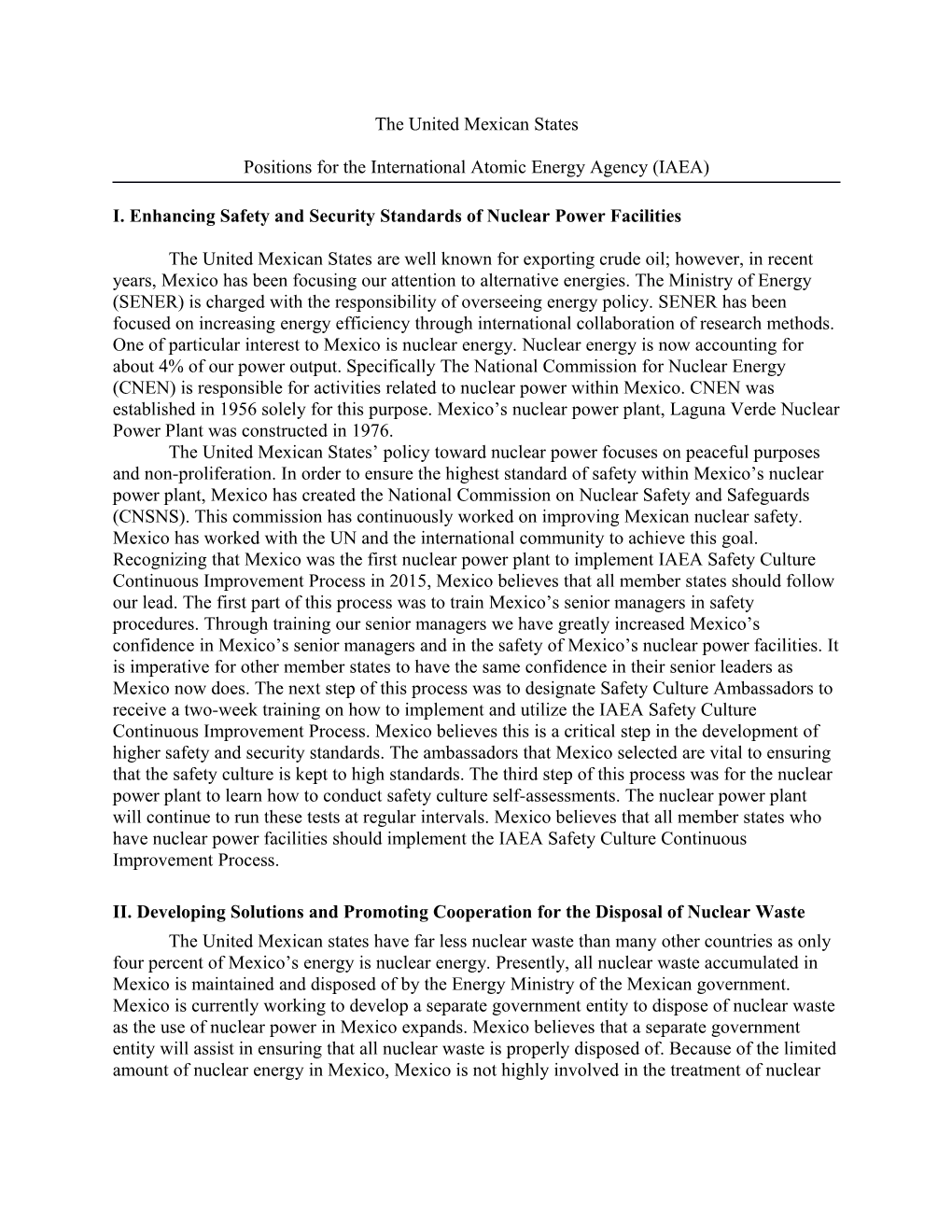The United Mexican States
Positions for the International Atomic Energy Agency (IAEA)
I. Enhancing Safety and Security Standards of Nuclear Power Facilities
The United Mexican States are well known for exporting crude oil; however, in recent years, Mexico has been focusing our attention to alternative energies. The Ministry of Energy (SENER) is charged with the responsibility of overseeing energy policy. SENER has been focused on increasing energy efficiency through international collaboration of research methods. One of particular interest to Mexico is nuclear energy. Nuclear energy is now accounting for about 4% of our power output. Specifically The National Commission for Nuclear Energy (CNEN) is responsible for activities related to nuclear power within Mexico. CNEN was established in 1956 solely for this purpose. Mexico’s nuclear power plant, Laguna Verde Nuclear Power Plant was constructed in 1976.
The United Mexican States’ policy toward nuclear power focuses on peaceful purposes and non-proliferation. In order to ensure the highest standard of safety within Mexico’s nuclear power plant, Mexico has created the National Commission on Nuclear Safety and Safeguards (CNSNS). This commission has continuously worked on improving Mexican nuclear safety. Mexico has worked with the UN and the international community to achieve this goal. Recognizing that Mexico was the first nuclear power plant to implement IAEA Safety Culture Continuous Improvement Process in 2015, Mexico believes that all member states should follow our lead. The first part of this process was to train Mexico’s senior managers in safety procedures. Through training our senior managers we have greatly increased Mexico’s confidence in Mexico’s senior managers and in the safety of Mexico’s nuclear power facilities. It is imperative for other member states to have the same confidence in their senior leaders as Mexico now does. The next step of this process was to designate Safety Culture Ambassadors to receive a two-week training on how to implement and utilize the IAEA Safety Culture Continuous Improvement Process. Mexico believes this is a critical step in the development of higher safety and security standards. The ambassadors that Mexico selected are vital to ensuring that the safety culture is kept to high standards. The third step of this process was for the nuclear power plant to learn how to conduct safety culture self-assessments. The nuclear power plant will continue to run these tests at regular intervals. Mexico believes that all member states who have nuclear power facilities should implement the IAEA Safety Culture Continuous Improvement Process.
II. Developing Solutions and Promoting Cooperation for the Disposal of Nuclear Waste
The United Mexican states have far less nuclear waste than many other countries as only four percent of Mexico’s energy is nuclear energy. Presently, all nuclear waste accumulated in Mexico is maintained and disposed of by the Energy Ministry of the Mexican government. Mexico is currently working to develop a separate government entity to dispose of nuclear waste as the use of nuclear power in Mexico expands. Mexico believes that a separate government entity will assist in ensuring that all nuclear waste is properly disposed of. Because of the limited amount of nuclear energy in Mexico, Mexico is not highly involved in the treatment of nuclear waste on a global scale. However, as Mexico continues to strengthen as a country their involvement in global nuclear energy increase.
Therefore, it is the position of Mexico that there must be a global standard by which nuclear waste is handled and disposed of in order to regulate the responsible usage of nuclear power and energy Mexico feels that as nuclear power becomes more prevalent both globally and domestically there must be a strategy for disposing of nuclear waste in a manner that does not threaten the safety and security of both humans and the environment. The United Mexican States would be in favor of a UN document or committee which would hold all member states accountable for responsible use of nuclear power and appropriate methods of waste management and disposal. Mexico would not, however, be interested in this type of control if it violates state sovereignty or forces any type of governmental system on any member states. Mexico would also be opposed to any type of UN action that places more burdens of nuclear waste on Mexico. Due to Mexico’s small amount of nuclear energy, Mexico would not be willing to take on more than its share of the responsibility for nuclear waste disposal. It is the position of Mexico that all member states must take responsibility for their own share of nuclear waste but must meet the global standards set forth by the UN.
